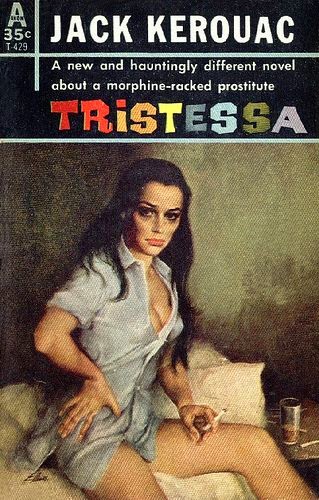Tristessa
Truman Capote said of Jack Kerouac's work, "That's not writing, that's typing." Up to now I would have disagreed with him, as I found On the Road and The Dharma Bums to be engaging and at times thrilling well written, but as for Tristessa, a novella he wrote in 1960, well, it seems more like typing.
Ostensibly, it is about Kerouac's fascination with a prostitute and morphine addict in Mexico City. Her name is Esperanza (which means "hope"), but he dubs her Tristessa (which means "sorrow"). For 96 pages Kerouac rambles on in stream of consciousness mode, talking about hanging around with drug dealers and his friend, Old Bull Gaines (who is based on Bill Garver, not William S. Burroughs, as Kerouac makes clear), a sixty-year-old junky.
I read this book quickly, as there is really nothing of a plot. It's simply Kerouac, perhaps under the influence, riffing on several things, none of them intelligibly. At times Kerouac shows flashes of his brilliance, even if he breaks the rules of grammar: "Night before I've in a quiet hassel in the rain sat with her darkly at Midnight counters eating bread and soup and drinking Delaware Punch, and I'd come out of that interview with a vision of Tristessa in my bed in my arms, the strangeness of her love-cheek, Azteca, Indian girl with mysterious lidded Billy Holliday eyes and spoke with great melancholic voice like Luise Rainer sadfaced Viennese actresses that made all Ukraine cry in 1910."
But to show how thin a line there is between great Beat writing and nonsense, consider this: "Bright explanation of the crystal clarity of all the Worlds, I need, to show that we'll all be all right--The measurement of robot machines at this time is rather irrelevant or at any time." Huh? This seems like just a random collection of words, assembled by a non-native English speaker.
Given the sensational quality of the first edition paperback cover, shown here, I would imagine that many thought they'd get something more salacious than what they did get, if they could understand it.
Though this is a blot on Kerouac's bibliography, one does have to marvel at sentences like this one: "Living but to die, here we wait on the shelf, and up in heaven is all that gold open caramel, ope my door--Diamond Sutra is the sky."
Ostensibly, it is about Kerouac's fascination with a prostitute and morphine addict in Mexico City. Her name is Esperanza (which means "hope"), but he dubs her Tristessa (which means "sorrow"). For 96 pages Kerouac rambles on in stream of consciousness mode, talking about hanging around with drug dealers and his friend, Old Bull Gaines (who is based on Bill Garver, not William S. Burroughs, as Kerouac makes clear), a sixty-year-old junky.
I read this book quickly, as there is really nothing of a plot. It's simply Kerouac, perhaps under the influence, riffing on several things, none of them intelligibly. At times Kerouac shows flashes of his brilliance, even if he breaks the rules of grammar: "Night before I've in a quiet hassel in the rain sat with her darkly at Midnight counters eating bread and soup and drinking Delaware Punch, and I'd come out of that interview with a vision of Tristessa in my bed in my arms, the strangeness of her love-cheek, Azteca, Indian girl with mysterious lidded Billy Holliday eyes and spoke with great melancholic voice like Luise Rainer sadfaced Viennese actresses that made all Ukraine cry in 1910."
But to show how thin a line there is between great Beat writing and nonsense, consider this: "Bright explanation of the crystal clarity of all the Worlds, I need, to show that we'll all be all right--The measurement of robot machines at this time is rather irrelevant or at any time." Huh? This seems like just a random collection of words, assembled by a non-native English speaker.
Given the sensational quality of the first edition paperback cover, shown here, I would imagine that many thought they'd get something more salacious than what they did get, if they could understand it.
Though this is a blot on Kerouac's bibliography, one does have to marvel at sentences like this one: "Living but to die, here we wait on the shelf, and up in heaven is all that gold open caramel, ope my door--Diamond Sutra is the sky."



Comments
Post a Comment